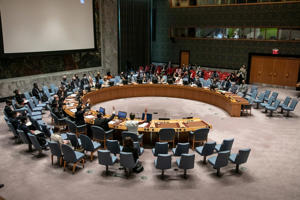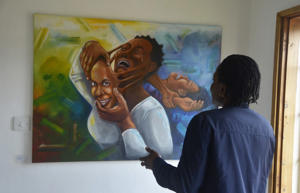Human trafficking moving deeper underground: UN report

The United Nations Security Council votes to adopt a resolution to renew the authorization of vessel inspection and seizure off the coast of Libya to curb migrant smuggling and human trafficking at UN Headquarters in New York, on Sept. 29, 2021. (Ariana Lindquist/UN Photo/Handout via Xinhua)
In addition to reducing opportunities for human traffickers to operate, the pandemic may have weakened law enforcement capacities to detect victims.
VIENNA, Jan. 24 (Xinhua) — For the first time in 20 years, the COVID-19 pandemic resulted in a decline in the number of detected human trafficking victims as there were fewer opportunities for traffickers to operate and some trafficking forms were less likely to be detected, a United Nations (UN) report said on Tuesday.
The number of trafficking victims identified globally dropped by 11 percent in 2020 from the previous year, driven by “fewer detections in low and medium-income countries,” according to the report published by the Vienna-based United Nations Office on Drugs and Crime (UNODC).
In addition to reducing opportunities for human traffickers to operate, the pandemic may have weakened law enforcement capacities to detect victims, the report said.

A woman visits an exhibition entitled “Passport” in Kampala, Uganda, March 9, 2021. Artworks are displayed at the exhibition to highlight the dangers of human trafficking. (Photo by Nicholas Kajoba/Xinhua)
The report, based on data from 141 countries, also showed a drop in the number of cases of trafficking for sexual exploitation during the pandemic. The pandemic-induced restrictions may have pushed such crimes into “more concealed and less safe locations” it said.
The number of persons convicted of human trafficking globally also fell by 27 percent in 2020 compared to 2019, with sharper decreases registered in South Asia, Central America, the Caribbean and South America.
UNODC Executive Director Ghada Waly said in a statement that the pandemic had “increased vulnerabilities to trafficking in persons, further undercutting capacities to rescue victims and bring criminals to justice.”
She called on the UN and the donor community to support national authorities, particularly those in developing countries, to respond to trafficking threats and to identify and protect victims. ■
This “Eyes on Trafficking” story is reprinted from its original online location.
 ABOUT PBJ LEARNING
ABOUT PBJ LEARNING
PBJ Learning is a leading provider of online human trafficking training, focusing on awareness and prevention education. Their interactive Human Trafficking Essentials online course is used worldwide to educate professionals and individuals how to recognize human trafficking and how to respond to potential victims. Learn on any web browser (even your mobile phone) at any time.
More stories like this can be found in your PBJ Learning Knowledge Vault.
EYES ON TRAFFICKING
This “Eyes on Trafficking” story is reprinted from its original online location.
ABOUT PBJ LEARNING
PBJ Learning is a leading provider of online human trafficking training, focusing on awareness and prevention education. Their interactive Human Trafficking Essentials online course is used worldwide to educate professionals and individuals how to recognize human trafficking and how to respond to potential victims. Learn on any web browser (even your mobile phone) at any time.
More stories like this can be found in your PBJ Learning Knowledge Vault.
